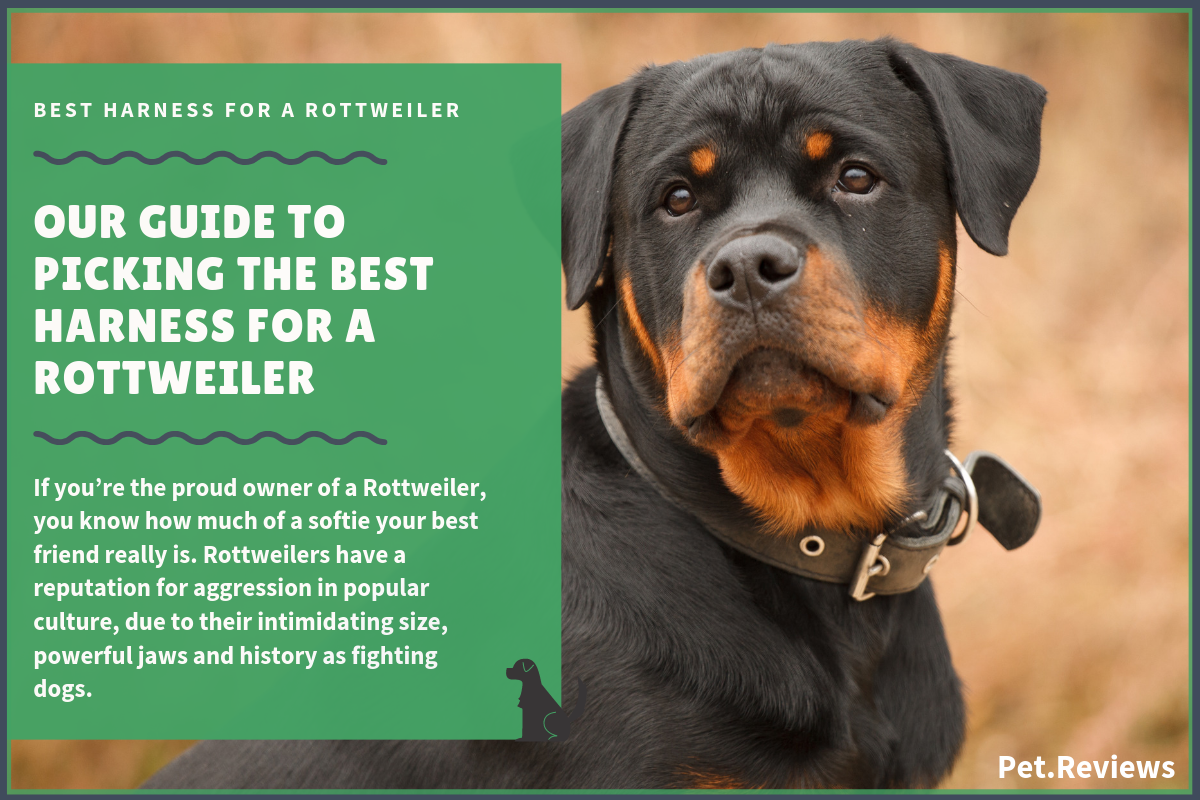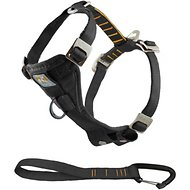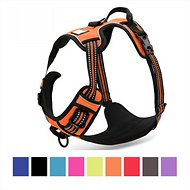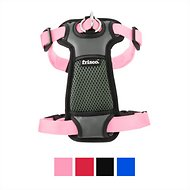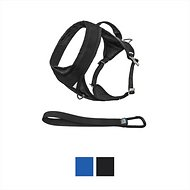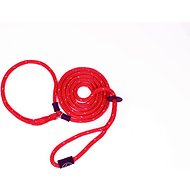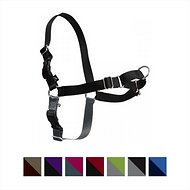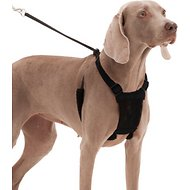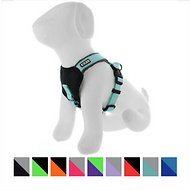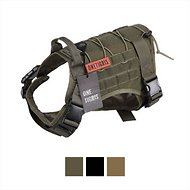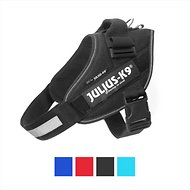10 Best Harnesses for Rottweilers: Our Walking, Hiking & No Pull Picks
Quick Guide
If you’re the proud owner of a Rottweiler, you know how much of a softie your best friend really is. Rottweilers have a reputation for aggression in popular culture, due to their intimidating size, powerful jaws and history as fighting dogs.
But in reality, Rottweilers are sweet, gentle giants – though they sometimes don’t know their own strength! They can also be quite curious and pull a lot on their collar or harness, and this can be hard to deal with due to their size.
If you’ve been having trouble finding a great harness for your Rottweiler, you’re in the right place. In this article, we’ll give you a comprehensive overview of all of the information you need to pick out a fantastic harness for your Rottie.
From materials to harness types, anti-escape and anti-chew features and more, we’ll go over it all – and also provide you with some of our own top picks for the best harnesses for Rottweilers. Read on, and learn everything you need to know.
What is the Best Harness for a Rottweiler?
- Kurgo Tru-Fit Smart Harness with Steel Nesting Buckles Enhanced Strength
- Chai’s Choice 3M Reflective Dog Harness
- Frisco Padded Front Lead Dog Harness
- Julius-K9 IDC Powerharness Dog Harness
- Kurgo Go-Tech Adventure Dog Harness with Seatbelt Loop
- Harness Lead Dog Harness
- PetSafe Easy Walk Dog Harness
- Sporn Non-Pull Mesh Dog Harness
- Pawtitas Reflective Padded Dog Harness
- OneTigris Tactical Service Vest Dog Harness
Popular Types of Rottweiler Harnesses
Wondering what types of harnesses are preferred by Rottweilers and their owners? Here are a few of the most common and popular types of Rottweiler harnesses.
- Hiking harnesses – Hiking harnesses usually are light and padded for all-day wear, but are quite strong and have metal hardware. They may also integrate a handle for use on the trail, and with seat belts for car rides. Other features sometimes include storage pockets.
- Chew-resistant harnesses – A determined Rottweiler can chew through almost anything. Chew-resistant harnesses are designed with straps that are hard to chew due to the position of the straps, which helps eliminate the risk of your Rottie chewing through its harness and escaping.
- No-pull harnesses – A Rottweiler who pulls heavily can be very hard to control, so a no-pull harness is usually a great choice, especially if you’re still training your Rottweiler. Most no-pull harnesses use a metal ring on the front, which gently guides your dog back to your side when it tries to pull ahead, helping it break the habit of pulling.
- Reflective harnesses – If you run or walk with your Rottweiler in the very early morning or late at night, a reflective harness will help you stay safe when walking near cars and other vehicles.
- Tactical harnesses – Tactical harnesses are usually very strong and include some kind of storage, like a MOLLE system. They’re popular for hiking and for dog training, due to their strength and convenience.
Many Rottweiler owners have multiple harnesses – one for everyday walks and one for hiking, for example – and depending on what you do with your Rottie, this may be a good idea for you.
Common Rottweiler Harness Materials
Wondering what kind of materials are used for Rottweiler harnesses? Here are a few of the most commonly-used materials, with a quick overview of the properties of each.
- Nylon – Nylon is very strong and durable, with a little bit of stretch. It’s an artificial fabric, so it’s also water repellent and very easy to clean, making it ideal for dog harnesses. The majority of Rottweiler harnesses are made from nylon.
- Polyester – Polyester is the second-most common material for dog harnesses, and is similar to nylon. It’s also a synthetic fabric, so it shares most of nylon’s traits including stretchability and strength, but it’s usually a bit more stiff, and not quite as soft.
- Mesh – Mesh can be made of either nylon or polyester, and it provides more stretch and breathability than a solid strap or piece of material. This makes it good for ventilation purposes.
- Cotton – Cotton harnesses are relatively uncommon for larger breeds like Rottweilers, but are still made by some companies. They are a good option for dogs with sensitive skin, as cotton is a 100% natural textile.
- Leather – Leather harnesses are very strong and durable, but are also quite heavy and expensive compared to modern fabric harnesses. They also require more maintenance like frequent oiling and cleaning, so they are not very common.
- Neoprene – Neoprene is often used alongside nylon, polyester and cotton as padding for straps and other harness components. It’s a moldable, soft rubber-like material that conforms to the curves of your dog’s body.
6 Key Components Of A Harness For A Rottweiler
What should you look for when buying a Rottweiler harness? Here are a few recommendations.
- Metal hardware – As a rule, metal hardware is best for Rottweilers. Your dog may not be aggressive, but it is very strong, and durable steel buckles and leash rings will help ensure it doesn’t get away from you on a walk.
- Strong, heavy-duty straps – Thick, durable straps are a must for Rottweilers, due to their strength. Thin straps may break during heavy pulling, or your Rottie may be able to chew through the strap before you notice, and get free.
- No-pull front ring – A front ring on a harness gently pulls your dog to your side when it tries to pull away from you. This helps correct excessive pulling, and keep your dog under control.
- Highly adjustable – Every Rottweiler is different, so adjustability is a must-have, particularly around the thick neck and chest of a Rottie.
- Padding for comfort – This is very important in older Rottweilers, due to the breed’s tendency to develop hip dysplasia and other joint conditions. Padding helps distribute pressure evenly when your dog is wearing a harness, preventing strain and injury.
- Attachment for seat belts – Many harnesses include a rear handle or a specialized attachment strap for use with a seat belt. Keeping your Rottweiler tethered to a seat belt in the car is a good idea due to its size and strength, and will also help keep you safe in an accident.
However, note that most harnesses only test for crash safety up to 75-90 lbs. If your Rottweiler is heavier than this, the harness will still help keep your dog safe while driving, but may not hold up in a collision.
Our Picks For The Best Harness For A Rottweiler
Ready to start looking at a few harnesses? Below, we’ve put together our favorite harnesses in a few different categories – these tried-and-true harnesses will all be a great option for your Rottweiler. Take a look now, and see if one of these Rottweiler harnesses is right for your pup.
| Our 2024 Picks: Best Harness for a Rottie: | |||
Kurgo Tru-Fit Smart Harness With Steel Nesting Buckles Enhanced Strength
|
CHECK PRICE | ||
Chai’s Choice 3M Reflective Dog Harness
|
CHECK PRICE | ||
Frisco Padded Front Lead Dog Harness
|
CHECK PRICE | ||
Kurgo Go-Tech Adventure Dog Harness With Seatbelt Loop
|
CHECK PRICE | ||
Harness Lead Dog Harness
|
CHECK PRICE | ||
PetSafe Easy Walk Dog Harness
|
CHECK PRICE | ||
Sporn Non-Pull Mesh Dog Harness
|
CHECK PRICE | ||
Pawtitas Reflective Padded Dog Harness
|
CHECK PRICE | ||
OneTigris Tactical Service Vest Dog Harness
|
CHECK PRICE | ||
Kurgo Tru-Fit Smart Harness with Steel Nesting Buckles Enhanced Strength
Key Features:
- Extremely durable design inspired by climbing harnesses
- Nesting, steel buckles for added strength
- Functions as a car harness
- Padded chest piece
Best Overall – This harness from Kurgo is our top choice for a Rottweiler harness. It uses an extremely strong nylon construction and steel hardware that can hold up to even the strongest pullers, and it features both a front ring for anti-pull use, as well as a back ring for use as a traditional harness. It’s also easy to adjust with five adjustment points, so it will fit your pooch perfectly.
Pros:
- Comes with carabiner and strap for use in the car
- Comfortable, easy to adjust
- Five adjustment points for a better fit
Cons:
- Only crash-test rated for dogs up to 75 lbs
- Relatively heavy
- Straps are somewhat stiff
Chai’s Choice 3M Reflective Dog Harness
Key Features:
- Durable yet lightweight design
- Includes reflective 3M material for enhanced safety
- Heavily padded, good for dogs with joint issues/hip dysplasia
- Simple to adjust
Runner Up – This harness by Chai’s Choice is our runner-up for the best Rottweiler harness. It’s more lightweight than the Kurgo harness, and also incorporates a highly-reflective 3M material which helps keep you and your pup safe on early morning or late-night walks. It also has a front ring for anti-pull use, as well as a traditional back ring, and features an easy-buckle design
Pros:
- Buckles make the harness easy to put on, take off
- Simple to adjust for a perfect fit
- Lightweight and padded for comfort
Cons:
- Plastic buckles may not be ideal for heavy pullers
- May be too tight for the largest Rottweilers
- Front adjustment tends to loosen on long walks
Frisco Padded Front Lead Dog Harness
Key Features:
- Padded and ventilated chest piece
- Simple step-through design
- Front no-pull ring
- Soft nylon and polyester straps
Most Affordable Pick – This harness from Frisco is our top choice if you need a Rottweiler harness, but you are on a tight budget and would like to balance quality and value. For the price, this harness delivers quite a bit of value, with both a front and rear leash attachment ring, durable straps, and an easy-to-use step-through design. However, we would not recommend this harness for very heavy pullers, as the plastic buckles may not hold up to the repeated stress of pulling.
Pros:
- Very lightweight
- Includes both front and rear rings for leash attachment
- Easy to put on and take off your Rottweiler
Cons:
- Plastic hardware and buckles may not hold up to strong dogs
- Will not hold up to chewing
- May rub without proper tightening and adjustment
Julius-K9 IDC Powerharness Dog Harness
Key Features:
- Comfortable, padded neoprene design conforms to your dog’s body
- Simple to put on and adjust
- Reflective patches for enhanced safety in darkness
- Extremely heavy-duty design
No Pull Harness – If your Rottweiler is a serious puller, or you just want to make sure that you can keep it secure in a situation where you need to maintain control of your dog, this harness from Julius K-9 is our top pick. It’s built from high-quality polyester and neoprene, with metal and polypropylene hardware. The rear ring is thick steel, and will be able to help you control even the strongest Rottie. A large rear handle helps you control your dog, and also allows this harness to be used in the car.
Pros:
- Ventilated design with soft neoprene padding
- Strong metal and plastic hardware
- Thick fabric to keep your dog comfortable and secure
Cons:
- Front velcro strap may not hold up for repeated use
- Heavy, compared to other options
- May not be ideal for hot-weather walks
Kurgo Go-Tech Adventure Dog Harness with Seatbelt Loop
Key Features:
- Reflective material for safety
- Strong steel hardware and durable nylon straps
- Includes carabiner and strap for use as a car tether
- Features both a front no-pull ring and rear ring
Best Hiking Harness – Rottweilers love going on adventures like hiking. When choosing a hiking harness, you need to make sure you can keep your dog safe and control it on the trail, but also choose a harness that’s not too heavy or constricting. This harness from Kurgo fits the bill perfectly. It uses strong nylon straps and metal hardware, and included a handle and carabiner/strap for use in the car. It also has plenty of ventilated padding, which keeps your dog comfortable and cool.
Pros:
- Strong nesting steel buckles
- Ventilated mesh to keep your Rottie from overheating
- Lightweight for all-day comfort
Cons:
- Neck cannot be adjusted
- Not crash-test rated
- Somewhat difficult to put on and take off
Harness Lead Dog Harness
Key Features:
No Escape Harness Lead – If your Rottweiler has a tendency to escape – either by “backing out” of step-in harnesses or simply chewing through harness straps, a harness lead is a great option. This harness lead features an incredibly strong nylon rope which is rated for 3,700 lbs of tensile strength, and a one-piece design that can fit dogs of any size. It also gently constricts your dog when it pulls excessively, releasing the tension when it stops pulling, so it helps address aggressive pullers, too!
Pros:
- No sharp buckles or stiff straps
- Can be adjusted to fit a dog of any size
- Incredibly strong nylon rope with escape-proof design
Cons:
- Lead is relatively short
- Difficult to adjust during first use
- Not a good choice for dogs with hip dysplasia or breathing difficulties
PetSafe Easy Walk Dog Harness
Key Features:
- Simple design
- Very lightweight
- Easy to take on and put off
- Front no-pull ring
Best Walking Harness – If you need a simple, lightweight harness to use on day-to-day walks with your Rottweiler, this product from PetSafe is a great option. It’s easy to put on and take off in just seconds, built with easy-to-wash nylon, and features a front no-pull ring. However, we would not recommend this harness for dogs that pull excessively, or aggressive dogs. A more durable, heavy-duty harness would be more appropriate, as this harness is not intended for extremely heavy pullers.
Pros:
- Four adjustment points for a tight fit
- Quick-snap buckles for easy use
- Available in 8 sizes, 7 colors and will fit any dog
Cons:
- No rear harness ring
- Not ideal for heavy pullers
- Relatively thin straps
3 More Top Rated Harnesses
Looking for a few more dog harnesses for your Rottweiler? Here are a few more picks that didn’t quite make our top list, but may still be a great option for your dog.
Sporn Non-Pull Mesh Dog Harness
We would recommend this harness for Rottweilers who do not pull excessively, and who need a soft harness that is ventilated for comfort. If you live a very hot, humid climate, for example, this could be a good option for daytime walks. The mesh is stretchy and breathable, and very comfortable for your dog. However, there is no front no-pull ring and the hardware is mostly plastic, making it less-than-ideal for pullers.
Pawtitas Reflective Padded Dog Harness
This padded dog harness from Pawtitas features reflective material, a robust polyester construction, and a soft, padded chest piece for your dog’s comfort. The thick neoprene keeps your dog comfortable, and a simple step-through design makes it easy to put on and take off of your Rottie. It’s easy to adjust, and will fit most dogs, though some larger Rottweilers may find that it is a somewhat tight fit.
OneTigris Tactical Service Vest Dog Harness
This tactical harness is a great idea if you’re training your Rottweiler, because it has built-in storage, and is built with a heavy-duty nylon material. It also has a fully-adjustable, padded neck and chest for a snug fit, as well as a control loop/handle and a strong metal ring to attach your leash. It does not have a no-pull front ring, however.
4 Common FAQs About Rottweiler Harnesses
Got more questions about Rottweiler harnesses? We’ve got answers! Here are a few common FAQs that can help you learn more about picking the right harness for your Rottie.
- What size harness should I get for my Rottweiler? The best way to find out what size of harness to get is to measure your dog’s neck and chest using a flexible measuring tape. Measure both the neck and chest at the broadest point, and use this information when shopping online for a Rottweiler harness.
If your dog is in-between sizes, we recommend going a size up. Rottweilers have thick and powerful necks and chests compared to other large breeds, so it’s usually a better idea to choose a larger harness that can be adjusted, rather than a harness that may be too small and tight. - Is a harness a good option for a Rottweiler who pulls? Yes – for a few reasons. First, a harness will help keep your dog safe, because you will be able to control your Rottweiler’s pulling more easily. It also helps protect your dog’s neck and throat – excessive pulling on a leash may damage your dog’s airway or neck.
But the best reason to use a harness for a Rottweiler who pulls is to break its bad habit once and for all. By picking a harness with a no-pull design, you can discourage pulling, and eventually break your dog’s bad habit. Check out our reviews above to find a good no-pull harness for your Rottie! - Will a harness irritate my Rottweiler’s skin? In most cases, a harness won’t irritate your dog’s skin. However, if you notice excessive rubbing or irritation where your dog’s harness sits, you should take the harness off, and discontinue wearing it for a few days.
Then, you can try re-adjusting the harness. You want it to be tight enough to fit two fingers inside the straps. Too loose, and it will slide around. Too tight, and it may rub against your dog’s flesh.
If this doesn’t help, you may want to consider a different style of harness. Harness leads, for example, use a strong rope design without edges or buckles, which can irritate the skin. We also recommend consulting with your vet, to ensure your Rottie doesn’t have an allergy or skin condition. - How can I keep my Rottweiler from chewing its harness? If your Rottweiler tends to chew its harnesses, it’s a good idea to only let it wear the harness on walks, and take it off around the house. You should also provide negative reinforcement – such as saying “No” whenever you notice your Rottie trying to chew its harness straps. Rewarding your dog when it does not chew on its straps during a walk is also a helpful strategy.
We hope these answers have helped you learn more about harnesses and your Rottweiler – think about what you’ve learned, and you’ll be able to pick the right product for your pup!
Conclusion
Thanks for reading our guide to the best Rottweiler harnesses. We hope it’s been helpful, and that you’ve learned everything that you need to know about picking out a great harness for your dog. So consider your needs and the needs of your Rottweiler, take another look at our top picks, and start shopping for the perfect harness today.

